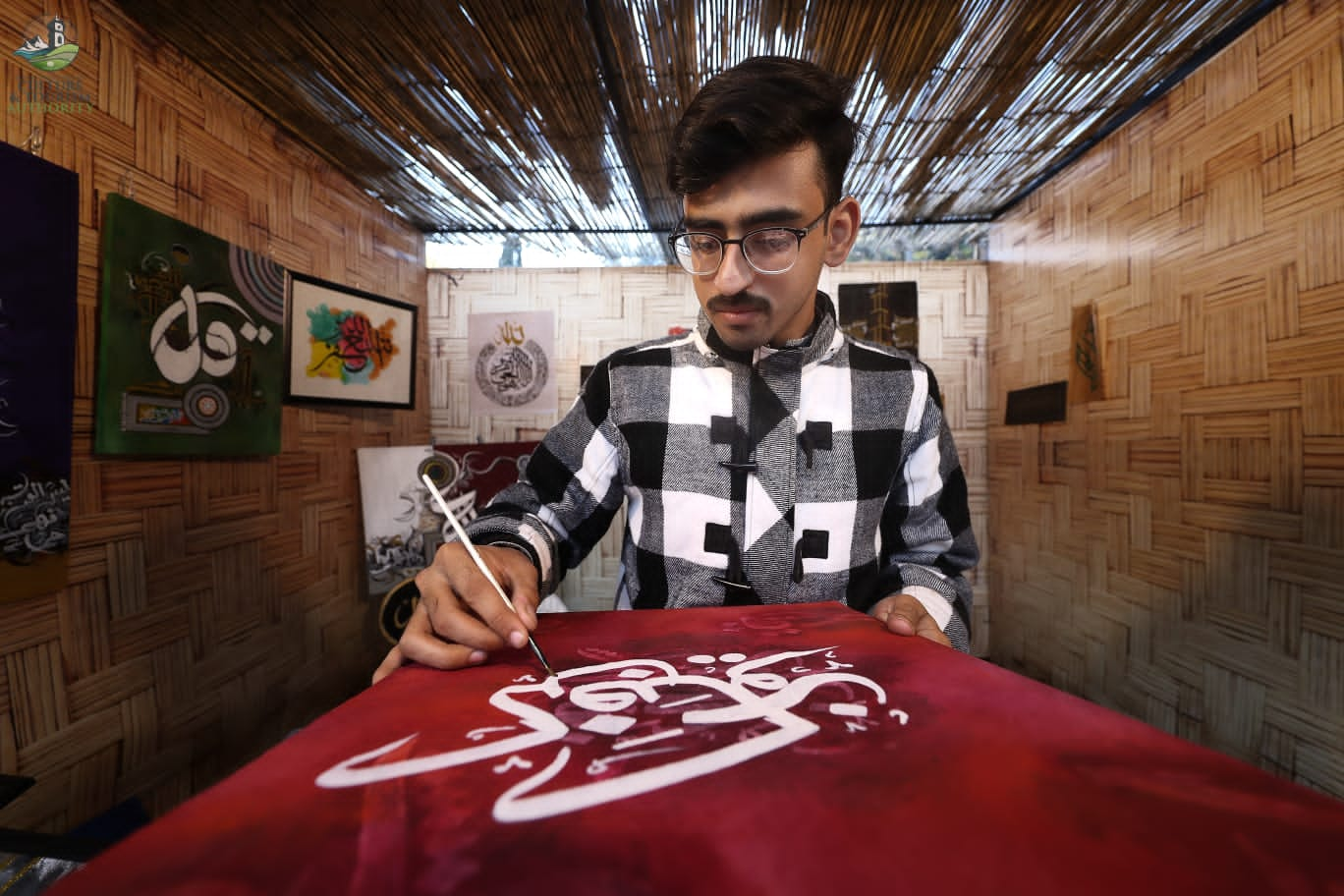Pak Youth: An Opportunity Not Burden
Pictorial Editorial
Shazia Mehboob: The young man in this picture is Saifur Rehman, a 2nd-year student at a technical institute in Haripur, Khyber-Pakhtunkhwa.
The youth had a dream to become a software engineer but the inability of his father to sponsor his dream landed him into a technical education centre. I met this young calligraphy artist during the cultural festival (Lok Mela) held in 2020. This youth had set up a stall of his artwork.
He was there along with his father to sell his paintings to earn some money in order to resume his education that was interrupted by Covid-19 Pandemic. During the lockdown his father had lost his job at the jewellery shop, the sole source of their income.
After that not only Saif had to stop his education, but the pandemic-driven lockdown had also put his four other siblings’ educational future on halt.
It was the 5th day of the 10-day festival in the capital city of Pakistan. Rehman was anxious and worried about generating enough income from the festival because his and siblings entire future hinged on around this.
God knows best whether Saif in fact succeeded in his efforts as visitors to the festival often are less inclined to purchase the items of calligraphic art.
Saif and his siblings are not alone but there are millions of others like him who are unable to fulfil their educational dreams and aspirations for the same or the similar reasons. The odds are against them in the system which is archaic and dysfunctional.
Most societies claim a higher moral ground when it comes to the treatment of young people. Pakistan is no exception to this. The litmus test is the ground-level reality and the actions taken to remedy the many inherent disparities that continue to hold back young people like Saif in our society from fulfilling their true potential.
Pakistan currently has the largest percentage of young people ever recorded in its history, as per UNDP report 2018. An estimated 64 per cent of the total population is below the age of 30 while 29 per cent is between the ages of 15 and 29 years. It is one of the youngest countries in the world and the second youngest in the South Asian region after Afghanistan.
If we succeed in engaging and utilizing youth properly, the youth can serve as catalysts for Sustainable Development Goals (SDGs).
Young people represent a ray of hope for this desperate country confronting numerous internal and external challenges with a feeble economy. Properly nurtured they will drive the country and the nation forward. Yet we continue to be woefully neglectful of them.
The country needs to prioritise the development of young people. The starting point has to be getting every child of school age enrolled in schools. Approaching 10 million children are out of school, a debilitating reality for the country that aspires for greater things.
Not educating our children is not an option for the country yet Pakistan spends least on education compared to its counterparts. There are only about a dozen or so countries that spend less on education than Pakistan.
There is an urgent need to address the many inherent disparities in education of access and quality. The provision of education for everyone is the responsibility of the government and should not be left to the private sector, motivated by money to be made at the expense of government failures.
To conclude, Pakistan must not look at young people as a burden but more of a building block for driving the country forward.
The writer is a freelance investigative journalist based in Islamabad and a PhD aspirant. She tweets @shizrehman.
Photo Credit: Lok Virsa, Islamabad
All information and facts provided are the sole responsibility of the writer.


The future of pakistan depends on its ability to educate and train its growing young population. In this respect, the country needs a long term vision and investment.
It is sad to see the government schooling system particularly at the primary and middle level go into continuous decline with brain drain of teachers and deterioration of buildings and facilities is
The private schooling sector is not only a financial burden on families but lacks focus, quality and accountability.
Thank You Shazia for drawing attention to this very important issue
In this article Shazia has diverted our attention to a very important
subject of long inherited negligence of the education of youth. But the education and training of youth and development of their potential is intrinsicall to future well-being and progress of Pakistan. If this great asset is ignored and not properly taped and beneficially utilised andinvested, Pakistan can remain a static society and doomed to fail to improve the quality of life of her people.